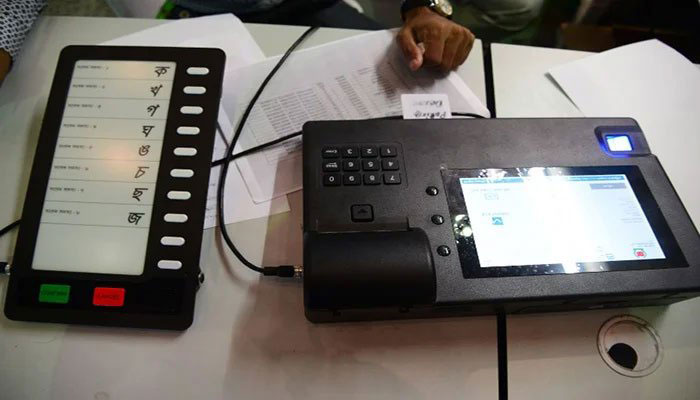EVMs, i-voting: Govt steps back from the brink to give dialogue a try
ISLAMABAD: Will the government and opposition parties budge from their rigid stands on the use of electronic voting machines (EVMs) and the introduction of i-voting for overseas Pakistanis in the next general elections?
Given that they have decided to sit under one roof in a bipartisan parliamentary committee to discuss these contentious issues shows that they are willing to hear each other out. Whether or not they will be able to forge an agreement is an open question.
They must now review their standpoints if they are sincere in evolving a consensus on electoral reforms. The change of mind on the part of the government to give dialogue with the opposition a try to resolve the row over the EVMs and i-voting marks a departure from its previous stance of not talking to its rivals.
When the government had bulldozed the two sets of amendments in the Elections Act, which consisted of 75 changes, in the National Assembly over three months ago, it had reached the conclusion that there was no point in engaging the opposition because it was hell-bent on going against every official proposal. At the time, no attempt was made to negotiate with the opposition parties. This further marred the political environment and built up tensions between the two sides.
If the parleys now fail to be productive, the government will take the proposed electoral reforms to a joint session of parliament for approval. It believes that it is in a comfortable position to get them passed.
Because of the readiness of the governing coalition and the opposition, the government has not got a motion carried by the National Assembly to table two electoral reforms bills in parliament. Prior to that, it was determined to convene the two houses for the purpose.
However, sanity prevailed, and the decision was reversed for the time being till the result of the deliberations in the parliamentary panel play out. While the government and the opposition will attempt to reach an accord, the Election Commission of Pakistan (ECP), which is a major stakeholder in this matter, will have to be satisfied about the use of EVMs and i-voting. Under the Constitution, it is the exclusive domain of the ECP to hold fair, free and transparent elections. The ECP is defending this constitutional responsibility and has shunned interference by any state agency in this matter.
As things stand today, the ruling alliance, on the one hand, completely supports the EVMs and i-voting, and the opposition parties and the ECP appear to be on the other side, dismissing both the proposals as unworkable.
One of their arguments is that unless the EVMs are tested in a limited election, they should not be used in the massive exercise of parliamentary polls. While the parliamentary committee is yet to be constituted, both sides are publicly speaking against and in favour of the EVMs and i-voting to project their views. None of them has felt the need to moderate their rhetoric so that a somewhat congenial atmosphere is created before the parleys. Experts believe that close to 700,000 EVMs will be required for the parliamentary polls.
They point out that if even a small number of the machines malfunction on polling day, a huge scandal could hit the electoral exercise, sabotaging the entire process. They recommend that in the first phase, certain federal and provincial constituencies be selected for the testing of the EVMs. If the experiment is successful, the coverage of the machines can be enlarged.
They stress that in the few countries where EVMs are being used, they had reached this stage after decades of tests and trials of the equipment. The questions about the transparency of the electoral process and secrecy of vote must be ensured before putting the EVMs into operation, the experts say.
-
 Why Ariana Grande Wants A 'tiny Mouse' To Play Her In Biopic?
Why Ariana Grande Wants A 'tiny Mouse' To Play Her In Biopic? -
 Wind Chill Returns With Brutal Cold As Polar Vortex Stalls Over Canada
Wind Chill Returns With Brutal Cold As Polar Vortex Stalls Over Canada -
 Costco $20 Rule Explained As Employee Pay Climbs Across North America
Costco $20 Rule Explained As Employee Pay Climbs Across North America -
 Strange Incident Happened At Nancy Guthrie's Home On Abduction's 10th Day
Strange Incident Happened At Nancy Guthrie's Home On Abduction's 10th Day -
 Tumbler Ridge School Lockdown Underway As RCMP Investigate School Shooting
Tumbler Ridge School Lockdown Underway As RCMP Investigate School Shooting -
 Britney Spears Quietly Parts Ways With Her Music Catalog: Report
Britney Spears Quietly Parts Ways With Her Music Catalog: Report -
 Princess Diana Bodyguard Suspected ‘she Could Die’: Here’s How
Princess Diana Bodyguard Suspected ‘she Could Die’: Here’s How -
 Teddi Mellencamp Marks Huge Milestone With Emotional Message Amid Cancer
Teddi Mellencamp Marks Huge Milestone With Emotional Message Amid Cancer -
 King Charles Makes It ‘absolutely Clear’ He Wants To Solve Royal Crisis
King Charles Makes It ‘absolutely Clear’ He Wants To Solve Royal Crisis -
 Kylie Jenner Looks Back With 'grace' On Early Fame Years: 'Just Being Myself'
Kylie Jenner Looks Back With 'grace' On Early Fame Years: 'Just Being Myself' -
 Royal Family Warned To ‘have Answers’ Amid Weak Standing
Royal Family Warned To ‘have Answers’ Amid Weak Standing -
 Marc Anthony On Why Bad Bunny’s Super Bowl Show Mattered
Marc Anthony On Why Bad Bunny’s Super Bowl Show Mattered -
 Kid Rock Gets Honest About Bad Bunny’s Performance At Super Bowl
Kid Rock Gets Honest About Bad Bunny’s Performance At Super Bowl -
 Kylie Jenner Reveals Real Story Behind Her 'The Moment' Casting
Kylie Jenner Reveals Real Story Behind Her 'The Moment' Casting -
 Jaafar Jackson Breaks Silence On Becoming Michael Jackson
Jaafar Jackson Breaks Silence On Becoming Michael Jackson -
 Eva Mendes Admits She Was Jealous Of Ryan Gosling’s CGI ‘girlfriend’ Rocky
Eva Mendes Admits She Was Jealous Of Ryan Gosling’s CGI ‘girlfriend’ Rocky




